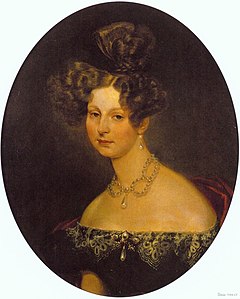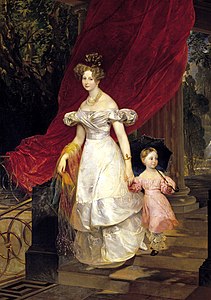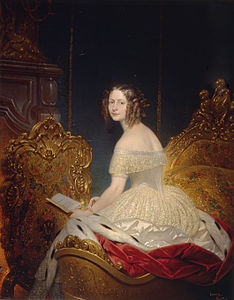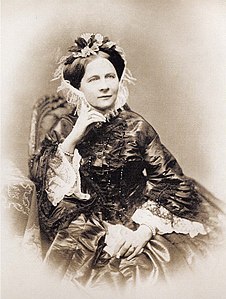Princess Charlotte of Württemberg
This article may be expanded with text translated from the corresponding article in Russian. (July 2012) Click [show] for important translation instructions.
|
| Grand Duchess Elena Pavlovna | |
|---|---|
 | |
| Born | (1807-01-09)9 January 1807 Stuttgart, Kingdom of Württemberg |
| Died | 2 February 1873(1873-02-02) (aged 66) Stuttgart, Kingdom of Württemberg, German Empire |
| Spouse | Grand Duke Michael Pavlovich of Russia (m. 1824–1849; his death) |
| Issue | Grand Duchess Maria Mikhailovna Grand Duchess Elizabeth Mikhailovna, Duchess of Nassau Grand Duchess Catherine Mikhailovna Grand Duchess Alexandra Mikhailovna Grand Duchess Anna Mikhailovna |
| House | Württemberg |
| Father | Prince Paul of Württemberg |
| Mother | Princess Charlotte of Saxe-Hildburghausen |
| Religion | Russian Orthodox prev. Lutheran |
Princess Charlotte of Württemberg (9 January 1807 – 2 February 1873) was later known as Grand Duchess Elena Pavlovna, the wife of Grand Duke Michael Pavlovich of Russia. He was the youngest son of Emperor Paul I of Russia and Duchess Sophie Dorothea of Württemberg.
Contents
1 Early life
2 Marriage and issue
3 Influence at the Russian court
4 Gallery
5 Ancestry
6 Bibliography
7 Notes
8 External links
Early life
She was born in Stuttgart, as Princess Charlotte of Württemberg, eldest daughter of Prince Paul of Württemberg and Princess Charlotte of Saxe-Hildburghausen. As a child, Charlotte lived in Paris with her father and her younger sister Pauline. Their home was quite modest compared to royal standards. It was in Paris that Charlotte came under the tutelage of several intellectuals.
Marriage and issue
In 1822, she became engaged to Grand Duke Mikhail Pavlovich of Russia, her first cousin once removed (Mikhail's mother was her father's aunt). It was said that Charlotte was an exceptional girl, highly intelligent and mature for her age of 15.[1] The Grand Duke was obviously impressed by her beauty and her poise, and during a reception held in her honor, she charmed all the guests with her conversations.[1] On 17 December 1823, she was received into the Russian Orthodox Church and was given the name Elena Pavlovna.[2] On 20 February 1824, the couple married in Saint Petersburg and settled in the Mikhailovsky Palace. When the Dowager Empress Maria Feodorovna died in 1828, the palace of Pavlovsk passed on to Mikhail and he and Elena visited it often. Their marriage was not a happy one: Mikhail's only passion was for the army and he neglected Elena. Nevertheless, he and Elena had five daughters:
Grand Duchess Maria Mikhailovna of Russia (9 March 1825 Moscow – 19 November 1846 Vienna); died unmarried
Grand Duchess Elizabeth Mikhailovna of Russia (26 May 1826 Moscow – 28 January 1845 Wiesbaden); married Adolphe, Grand Duke of Luxembourg and died in childbirth
Grand Duchess Ekaterina Mikhailovna of Russia (28 August 1827 Saint Petersburg – 12 May 1894 Saint Petersburg), married Duke Georg August of Mecklenburg-Strelitz
Grand Duchess Alexandra Mikhailovna of Russia (28 January 1831 Moscow – 27 March 1832 Moscow)- Grand Duchess Anna Mikhailovna of Russia (27 October 1834 Moscow – 22 March 1836 Saint Petersburg)
Influence at the Russian court
Elena was a close friend of her brother-in-law, Alexander I of Russia and his wife the Empress Elizabeth Alexeievna. She was also quick to befriend the shy Maria Alexandrovna, the wife of the then Tsarevich Alexander. When Princess Charlotte's husband died, in 1849, she became a patron of several charitable organizations and the arts. She founded the Saint Petersburg Conservatoire as well as a group of nursing sisters which would eventually become the forerunners of the Red Cross in Russia. During her time in Russia, she became known as the "family intellectual", and was considered the most exceptional woman in the family since Catherine the Great. She founded the Russian Musical Society and the Conservatoire, and was also liberal on serfdom. She helped to push Alexander II to abolish serfdom while he stayed with her.[3]
As a patroness of the composer Anton Rubinstein, she commissioned his first three operas: Fomka the Fool (1853), The Siberian Hunters, and Vengeance.[4]
Elena died in Stuttgart, at the age of 66.
Gallery

Elena Pavlovna as a young girl, 1824.

Grand Duchess Elena Pavlovna by Karl Bryullov, 1829.

Elena with her eldest daughter Maria, 1830s.

Grand Duchess Elena Pavlovna of Russia (nee Princess Charlotte of Württemberg), 1842

Elena Pavlovna by Joseph-Desire Court (Russian Museum, St. Petersburg), 1842.

Grand Duchess E.Pavlovna in middle age, by Christina Robertson, 1850s

Grand Duchess Elena Pavlovna by Winterhalter (1862, Hermitage Museum).

E.Pavlovna in old age, late 1860s

A photograph of Elena Pavlovna in her final years, 1872.
Ancestry
.mw-parser-output table.ahnentafel{border-collapse:separate;border-spacing:0;line-height:130%}.mw-parser-output .ahnentafel tr{text-align:center}.mw-parser-output .ahnentafel-t{border-top:#000 solid 1px;border-left:#000 solid 1px}.mw-parser-output .ahnentafel-b{border-bottom:#000 solid 1px;border-left:#000 solid 1px}
| Ancestors of Princess Charlotte of Württemberg | ||||||||||||||||||||||||||||||||||||||||||||||||||||||||||||||||||||||||||||||||||||||||||||||||||||||||||||||||||||||||||||||||||||||||||||||||||||||||||||||||||||||||||||||||||||||||||||||||||||||||||||||||||||||||||||||||||||||||||||||||||||||||||||||||||||||||||||||||||||||||||||||||||||||||||||||||||||||||||||||||||||||||||||||||||||||||||||||||||||||||||||||||||||||||||||||||||||||||||||||||||||||||||||||||||||||||||||||||||||||||||||||||||||||||||||||||||||||||||||||||||||||||||||||||||||||||||||||||||||||||||||||||||||||||||||||||||||||||||||||||||||||||||||||||||||||||||||||||
|---|---|---|---|---|---|---|---|---|---|---|---|---|---|---|---|---|---|---|---|---|---|---|---|---|---|---|---|---|---|---|---|---|---|---|---|---|---|---|---|---|---|---|---|---|---|---|---|---|---|---|---|---|---|---|---|---|---|---|---|---|---|---|---|---|---|---|---|---|---|---|---|---|---|---|---|---|---|---|---|---|---|---|---|---|---|---|---|---|---|---|---|---|---|---|---|---|---|---|---|---|---|---|---|---|---|---|---|---|---|---|---|---|---|---|---|---|---|---|---|---|---|---|---|---|---|---|---|---|---|---|---|---|---|---|---|---|---|---|---|---|---|---|---|---|---|---|---|---|---|---|---|---|---|---|---|---|---|---|---|---|---|---|---|---|---|---|---|---|---|---|---|---|---|---|---|---|---|---|---|---|---|---|---|---|---|---|---|---|---|---|---|---|---|---|---|---|---|---|---|---|---|---|---|---|---|---|---|---|---|---|---|---|---|---|---|---|---|---|---|---|---|---|---|---|---|---|---|---|---|---|---|---|---|---|---|---|---|---|---|---|---|---|---|---|---|---|---|---|---|---|---|---|---|---|---|---|---|---|---|---|---|---|---|---|---|---|---|---|---|---|---|---|---|---|---|---|---|---|---|---|---|---|---|---|---|---|---|---|---|---|---|---|---|---|---|---|---|---|---|---|---|---|---|---|---|---|---|---|---|---|---|---|---|---|---|---|---|---|---|---|---|---|---|---|---|---|---|---|---|---|---|---|---|---|---|---|---|---|---|---|---|---|---|---|---|---|---|---|---|---|---|---|---|---|---|---|---|---|---|---|---|---|---|---|---|---|---|---|---|---|---|---|---|---|---|---|---|---|---|---|---|---|---|---|---|---|---|---|---|---|---|---|---|---|---|---|---|---|---|---|---|---|---|---|---|---|---|---|---|---|---|---|---|---|---|---|---|---|---|---|---|---|---|---|---|---|---|---|---|---|---|---|---|---|---|---|---|---|---|---|---|---|---|---|---|---|---|---|---|---|---|---|---|---|---|---|---|---|---|---|---|---|---|---|---|---|---|---|---|---|---|---|---|---|---|---|---|---|---|---|---|---|---|---|---|---|---|---|---|---|---|---|---|---|---|---|---|---|---|---|---|---|---|---|---|---|---|---|---|---|---|---|---|---|---|---|---|---|---|---|---|---|---|---|---|---|---|---|---|---|---|---|---|---|---|---|---|---|---|---|---|---|---|---|---|---|---|---|---|---|---|---|---|---|---|---|---|---|---|---|---|---|---|---|---|---|---|---|---|---|---|---|---|---|---|---|---|---|---|---|---|---|---|---|---|---|---|---|---|---|---|---|
| ||||||||||||||||||||||||||||||||||||||||||||||||||||||||||||||||||||||||||||||||||||||||||||||||||||||||||||||||||||||||||||||||||||||||||||||||||||||||||||||||||||||||||||||||||||||||||||||||||||||||||||||||||||||||||||||||||||||||||||||||||||||||||||||||||||||||||||||||||||||||||||||||||||||||||||||||||||||||||||||||||||||||||||||||||||||||||||||||||||||||||||||||||||||||||||||||||||||||||||||||||||||||||||||||||||||||||||||||||||||||||||||||||||||||||||||||||||||||||||||||||||||||||||||||||||||||||||||||||||||||||||||||||||||||||||||||||||||||||||||||||||||||||||||||||||||||||||||||
Bibliography
- Lincoln, W. Bruce. The Romanovs: Autocrats of All the Russians. 1983
- Sebag Montefiore, Simon. The Romanovs: 1613-1918. 2016. Knopf Publishing Group.
- Taylor, Philip S., Anton Rubinstein: A Life in Music, Indianapolis, 2007
- Zeepvat, Charlotte. Romanov Autumn. 2001
Notes
^ ab Zeepvat, p.19.
^ Zeepvat, p.20.
^ Sebag Montefiore, p. 546
^ Taylor (2007), 39








